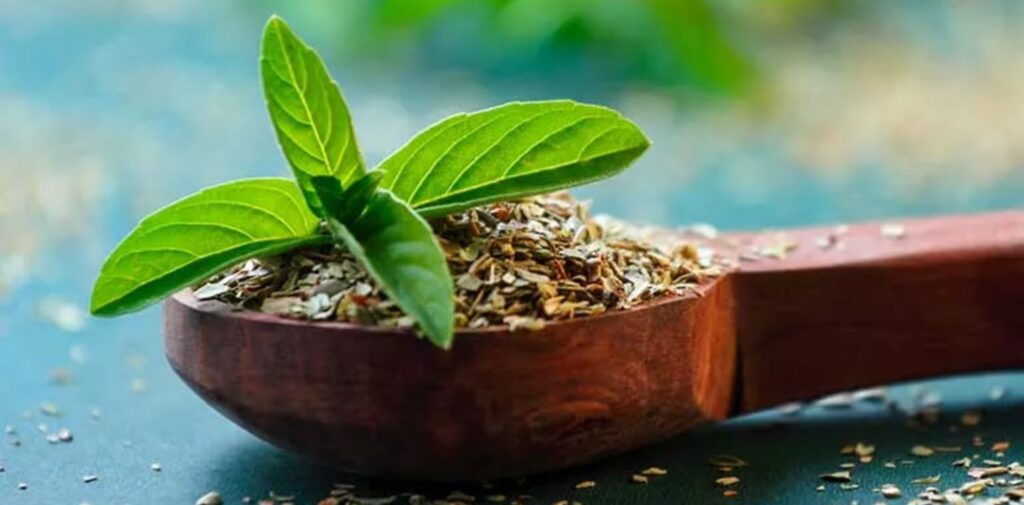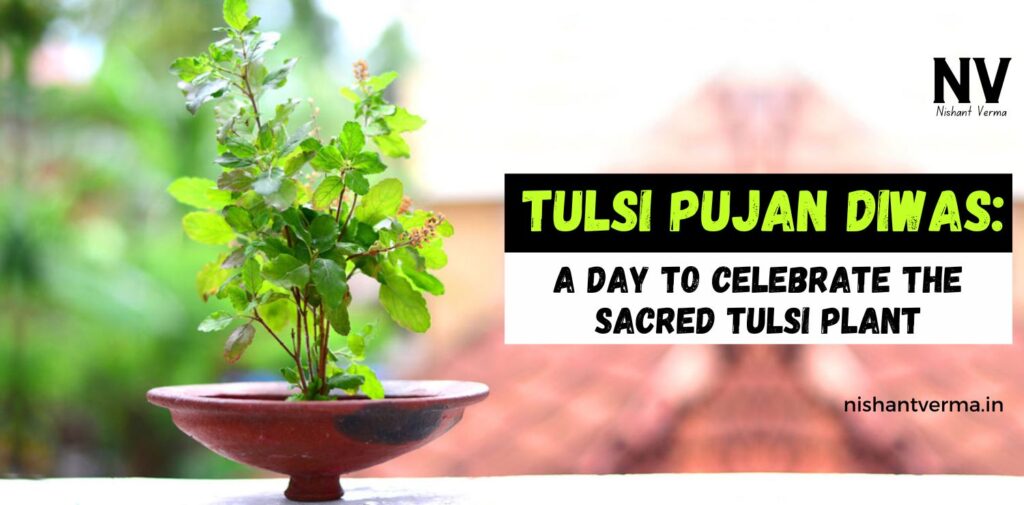Every year, on December 25th, millions of Hindus across India celebrate Tulsi Pujan Diwas, a day dedicated to worshipping the sacred Tulsi plant. The day is of great importance in Hindu culture as the Tulsi plant, also known as Holy Basil, is believed to have immense spiritual, medicinal, and environmental significance. Let’s take a closer look at this special day and understand why it’s celebrated with such reverence and devotion.
The Significance of Tulsi in Hinduism
In Hinduism, the Tulsi plant holds a very special place. It is not just a plant; it is considered a goddess in its own right. The word “Tulsi” is derived from the Sanskrit word meaning “matchless” or “incomparable,” reflecting the plant’s purity and spiritual significance. According to Hindu mythology, Tulsi is a manifestation of Goddess Lakshmi, the goddess of wealth and prosperity.
The story behind the Tulsi plant’s sacred status begins with the legend of Tulsi and Lord Vishnu. It is believed that Tulsi was once a beautiful woman named Vrinda. She was devoted to her husband, but due to a curse, her soul was transformed into the plant we now recognize as Tulsi. Over time, she became a symbol of purity, devotion, and the power of prayer. Her plant form is revered and worshipped in Hindu households to this day.

The Connection Between Tulsi and Lord Vishnu
Tulsi’s connection with Lord Vishnu makes her even more important to Hindus. It is said that Lord Vishnu, who is one of the principal deities of Hinduism, can never be pleased without the presence of Tulsi leaves in his offerings. The leaves are often used in daily worship rituals and are considered essential in the preparation of offerings for Lord Vishnu, especially during the festival of Tulsi Vivah, which marks the divine marriage of Tulsi and Lord Vishnu.
Moreover, it is believed that worshipping the Tulsi plant brings spiritual benefits and divine blessings. Regular prayers and offerings to Tulsi are said to purify the soul, remove sins, and bring prosperity, health, and happiness to the devotee’s life.
Why Celebrate Tulsi Pujan Diwas?
Tulsi Pujan Diwas, celebrated on December 25th, is the perfect occasion to express devotion to this sacred plant. The day is marked by the worship of Tulsi plants in homes, temples, and even public spaces. Devotees gather around the plant to perform rituals, offer prayers, and seek blessings for a peaceful and prosperous life.
The day also holds cultural significance. It is the ideal time to spread awareness about the importance of Tulsi, which is often regarded as a symbol of good health, purity, and spiritual growth. It serves as a reminder of how the Tulsi plant has been an essential part of daily life for centuries, not only for religious reasons but also for its health benefits and environmental contributions.

Rituals and Traditions of Tulsi Pujan Diwas
Tulsi Pujan Diwas is celebrated with devotion and zeal. The rituals performed on this day are relatively simple, but they carry deep spiritual significance. Here’s how people usually observe the day:
- Cleaning and Decorating the Tulsi Plant: On this day, devotees clean the area around the Tulsi plant and decorate it with flowers and lights. The plant is given a special place of honor, and people often adorn it with garlands or colorful threads. The clean and decorated Tulsi plant symbolizes purity and devotion.
- Offering Water and Prayers: Devotees offer clean water to the Tulsi plant, which is an essential part of the worship. Water is offered every morning as part of the daily ritual, but on Tulsi Pujan Diwas, the offering becomes even more significant. Prayers are recited to seek the blessings of Goddess Tulsi for happiness, good health, and prosperity.
- Lighting Incense and Diyas: Incense sticks and oil lamps (diyas) are lighted around the Tulsi plant during the prayer. The fragrance of the incense and the soft glow of the lamps create a peaceful and spiritual atmosphere, enhancing the devotion of the worshippers.
- Reciting Tulsi Stotra: One of the important aspects of Tulsi Pujan Diwas is the recitation of the “Tulsi Stotra” – a hymn dedicated to praising the Tulsi plant. This is done with great reverence and devotion. It is believed that the recitation of this hymn brings blessings and helps to fulfill wishes.
- Offering Tulsi Leaves to Lord Vishnu: Tulsi leaves are considered sacred, especially when offered to Lord Vishnu. On Tulsi Pujan Diwas, devotees place Tulsi leaves at the feet of Lord Vishnu’s idols or pictures while offering their prayers. This symbolizes devotion and an offering of the heart to God.
- Tulsi Vivah: In some parts of India, Tulsi Pujan Diwas coincides with the celebration of Tulsi Vivah, the ceremonial marriage of Tulsi and Lord Vishnu. This ritual signifies the end of the monsoon season and the beginning of the wedding season. A symbolic marriage is performed between a Tulsi plant and a Vishnu idol, and the entire occasion is celebrated with great joy and festivity.
Health Benefits of Tulsi
Apart from its religious significance, Tulsi has been known for its medicinal properties for centuries. The plant is often called the “Queen of Herbs” because of its numerous health benefits. Here are some reasons why Tulsi is considered a valuable herb:
- Boosts Immunity: Tulsi is known for its powerful antibacterial, antiviral, and antifungal properties. Consuming Tulsi leaves regularly can help strengthen the immune system and protect the body from common infections.
- Reduces Stress and Anxiety: Tulsi is also known for its adaptogenic properties, which help the body cope with stress. Drinking Tulsi tea or using Tulsi oil can help reduce anxiety and promote mental well-being.
- Improves Respiratory Health: Tulsi is highly effective in treating respiratory conditions such as asthma, bronchitis, and the common cold. It helps in clearing the airways and improving breathing.
- Promotes Healthy Skin: The leaves of the Tulsi plant are rich in antioxidants that help protect the skin from aging and skin diseases. Applying Tulsi extracts to the skin can reduce acne, pimples, and other skin problems.
- Supports Digestive Health: Tulsi helps in improving digestion and can also relieve symptoms of indigestion, bloating, and constipation. Regular consumption of Tulsi leaves can promote a healthy gut.

Environmental Importance of Tulsi
The Tulsi plant isn’t just important for spiritual or health reasons; it also plays a role in protecting the environment. Tulsi is known for its ability to purify the air and improve the overall quality of the environment. In many households, the Tulsi plant is placed in the courtyard or garden as it is believed to bring positive energy into the home and keep the atmosphere clean.
Conclusion: Celebrating Tulsi Pujan Diwas
Tulsi Pujan Diwas is more than just a religious celebration. It’s a day to acknowledge the sacred Tulsi plant, to honor its spiritual, medicinal, and environmental significance, and to seek blessings for a peaceful and prosperous life. Whether it’s through offering prayers, lighting lamps, or simply caring for the Tulsi plant, this day is a reminder of how nature and spirituality are deeply connected in Hinduism.
So, on December 25th, take a moment to honor the Tulsi plant, celebrate its divine presence, and enjoy its many benefits. Let Tulsi Pujan Diwas inspire you to bring peace, purity, and prosperity into your life, just as it has done for millions of people over the centuries.




